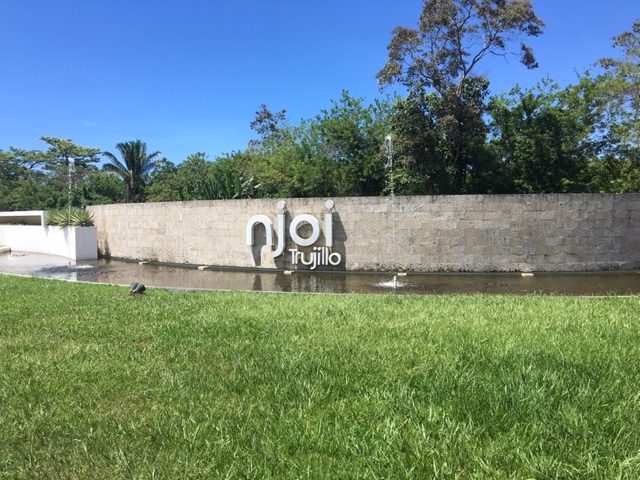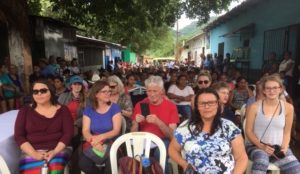A Country with Little Hope: Why Hondurans Migrate

Canadian company’s resort on Garifuna land.
By Janet Spring Simcoe County Honduras Rights Monitor
From May 25 – June 2, I travelled throughout Honduras with three Canadians and twelve US citizens to investigate why the Honduran people are leaving their home country to travel in massive caravans to the US border with hope to cross into the United States to seek asylum.
On May 25, our group landed in San Pedro Sula airport in the northern part of the country. On our first day, we met with leaders of the resistance movement in El Progreso and participated in a women’s torch light march. On our first evening, we met with a prominent human rights worker – Bartolo Fuentes – who advises and assists families and youth who wish to join the many caravans leaving the country.
 He informed us of the statistics that children as old as 4th to 6th grade have expressed interest in leaving the country for a better life. Approximately 63% of students graduating from high school also wish to leave, not because they do not love their country, but there are no jobs, no chance to find safe housing, there is a lack of medical treatment for the sick, extortion and gang violence is rampant, hence there is no hope for their future families. They also fear the illegitimate government’s lack of due legal process with no rule of law, impunity for the rich, goverment involvement with the gangs in violence and extortion, and drug wars.
He informed us of the statistics that children as old as 4th to 6th grade have expressed interest in leaving the country for a better life. Approximately 63% of students graduating from high school also wish to leave, not because they do not love their country, but there are no jobs, no chance to find safe housing, there is a lack of medical treatment for the sick, extortion and gang violence is rampant, hence there is no hope for their future families. They also fear the illegitimate government’s lack of due legal process with no rule of law, impunity for the rich, goverment involvement with the gangs in violence and extortion, and drug wars.
Our group also heard a similar story as we spent an afternoon with a youth education project – Paso a Paso – in an area of the city located in one of the most dangerous neighbourhoods. We travelled north-east to Trujillo where many Canadian investors have illegally purchased land that has been expropriated by the illegitimate regime of Juan Orlando Hernandez and previous leaders of the government since the 2009 coup d’état. Further information on this topic.
In this area, the Garifuna people are terrorized as they defend their titled lands. Unsuspecting Canadian retirees who want to “buy smart, retire early” (a slogan used by a Canadian company called NJOI, which has also illegally purchased Garifuna land on the Caribbean Sea), are lured to this area to purchase time share properties on land that is in dispute in international courts. Trujillo is the city where the major cruise docks are located; many cruise lines that tour the Caribbean Sea dock in the port which is an unsafe area due to the land grabs and resulting unrest.
In this area, we also met with courageous Garifuna leaders who are reclaiming their lands and defending their territories, despite fear of repercussions from the military and thugs linked to private investors. The delegation continued our travels south-west to La Esperanza, the birthplace of Berta Caceres, a very well-known indigenous leader and land defender who was murdered by government linked forces in 2016 for her work in stopping a large hydro-electric dam in her Lenca community. Our group continued to hear the story of how police and military shoot live bullets into the crowds of marchers who are defending their lands and protesting the regime of Juan Orlando Hernandez.
Mid-week we visited the capital city of Tegucigalpa. Here and in other parts of the country, our delegation witnessed many marches and roadblocks whilst the teachers and medical doctors and healthcare workers took to the streets to protest the proposed privatization of healthcare and education by the Hernandez government. The city was impassable in many areas; some of our meetings were canceled due to travel issues. Yet we were all inspired by the amazing courage and resolve of the people to make change in the country. As youth and adults joined teachers and medical workers, they took to the streets, yet were at risk of being terrorized by military in riot gear; heavy teargas lingered in the air and the threat of being shot in the streets was high.
Edwin Espinal and Raul Alvarez were very pleased that our whole delegation received special permission to visit them in La Tolva Prison later in the week. During our two-hour visit, Edwin and Raul talked about the conditions in the prison – lack of fresh water and sunlight, gang presence in the prison, very poor food quality and quantity. They were also eager to hear our perspectives on the political unrest and overall situation in the country with the marches and resulting military repression.
All prisoners in La Tolva have limited exposure to news and only from a government controlled television station so they were interested in hearing about our meetings with grassroots organizations. Edwin and Raul also discussed the reasons why the Honduran people are losing hope for a better future, hence are joining the mass exodus out of the country. They also discussed their unwarranted arrests, how they were arrested only for speaking out against the government, the issues they have faced in prison for the past 17 months and how these have negatively affected their mental health and wellbeing.
One of the most discouraging part of the delegation were the events on our second last day when we met with Canadian Embassy and afterwards US Embassy officials. Both CDN and US Embassy staff did not address our questions and concerns regarding the unrest in the country and the illegitimacy of the government. Yet as we met, healthcare and education workers lined the streets and heavy teargas was in the air.
In the meeting with the acting US Chargé d’Affaires – Dana Deree, he informed us that during an earlier visit to La Tolva Prison, he was amazed at the living conditions inside the facility. He mentioned that in his visit to the prison kitchen, the food that was being prepared looked wonderful. He even commented that he would gladly “eat lunch there.” If I had been given the opportunity to comment, I would have asked him why he didn’t eat lunch there at that time!
Deree also remarked that the prison inmates that he met were treated with great respect by the prison director. According to him, La Tolva was an exemplary facility! As Deree’s comments continued to negated everything that has ever been researched about La Tolva Prison and conditions in other prisons in Honduras, why the Honduran people are leaving in mass exodus, as well as the illegitimacy of the Honduran government, the fire alarm sounded in the Embassy. A stack of tires had been set ablaze at the front entrance of the US Embassy, despite the normal heavy security that is posted at all entrances. The Embassy then went on full alert and was in lockdown. As alarms screamed, the loudspeaker called out, “Duck and cover!”.
Our delegation group were finally escorted out of the building by the rear entrance. Yet in no way were we in danger as the fire was set outside on the front steps. One teacher was arrested for participating in the disturbance yet the Honduran government has been heavily criticized by human rights groups that the original fire was set by infiltrators, and not those who were part of the teachers’ and healthcare workers’ march.
On our last day of the delegation, we traveled 3 hours to a very remote area in the south called Reitoca, an indigenous Lenca community that has been in a struggle with the Honduran government and a hydroelectric dam company that started to build a dam on the Rio Grande River in their community. As our bus had to travel through a mountainous area on a treacherous dirt road, we arrived late. Yet we were greeted by over 300 residents of the community who waited patiently for our arrival. Our group was treated to music and a luncheon and were honoured at their ceremony and community meeting.
On this day, the delegation witnessed amazing perseverance, courage, and community resolve to stop the dam project, and to protect their human rights, despite many attempts made by the company to silence them by murdering members of the community and terrorizing the residents. This day was one to remember. After meeting with human rights groups, associations, and individuals, we learned the reasons why the Honduran people are so desperate to leave their home country and willing to take major risks on the journey to the north with no guarantee that they will be successful. Those who remain in Honduras have an amazing resolve to oppose and fight the corrupt narco-trafficking Honduran government that makes their lives miserable. Yet many Hondurans have made the choice to leave their homes; we saw and heard first-hand how difficult their lives are due to corruption, impunity, lack of due legal process, limited employment, and violence.
Edwin Espinal and Raul Alvarez thank the organizers and participants who visited them in the ‘Roots of migration’ delegation. They remarked that our visit “gave them hope.” They also send their gratitude to the greater Simcoe County community and beyond for their ongoing moral support. Edwin and Raul also thank those who have contributed to the GoFundMe bail campaign that so far has raised over $13,000.









Leave a Reply